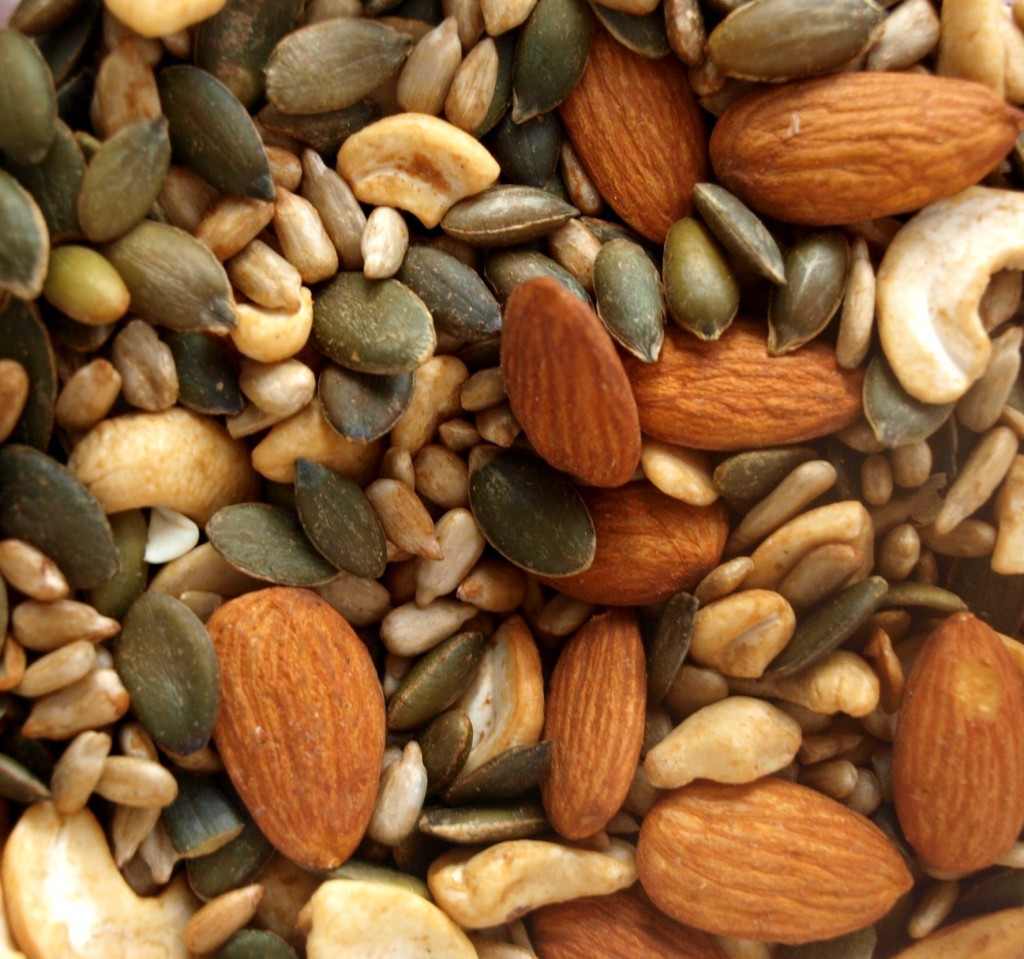
New Scientifically Validated Guidelines: Nuts and Seeds
Photo Credit: Martin Weller,via Flickr Creative Commons
The Dr. Dean Ornish’s Program for Reversing Heart Disease now allows a limited amount of select nuts and seeds. The reason for this change is because in the last decade a lot of research has focused on the influence of eating nuts and seeds on our health. Both epidemiological studies and clinical trials have shown impressive evidence that nut consumption is associated with cardiovascular health and the reduction of major chronic diseases such as type 2 diabetes.
Consuming nuts and seeds correlates with a consistent 30-50% lower risk of cardiovascular disease.
Several of the largest cohort studies, including the Adventist Study, the Iowa Women’s Health Study, the Nurses’ Health Study, and the Physicians’ Health Study have shown that consuming nuts and seeds correlates with a consistent 30-50% lower risk of cardiovascular disease (CVD), myocardial infarction, sudden cardiac death, and stroke. Decreased cholesterol has also been associated with eating nuts.
Nuts Consumption Approved by the FDA and the American Heart Association
Beginning in 2003, the U.S. Food and Drug Administration (FDA) acknowledged the impressive evidence for an association between nut consumption and CVD risk by approving the following health claim for nuts: “Scientific evidence suggests, but does not prove that eating 1.5 ounces (42 g) per day of most nuts as part of a diet low in saturated fat and cholesterol may reduce the risk of heart disease.”
In 2010, the American Heart Association (AHA) issued new food-based and nutrient recommendations with the goal to improve the cardiovascular health of all Americans by 20% and reduce deaths from cardiovascular diseases and stroke by 20% by 2020. These guidelines include increasing unsalted nuts and seeds in your diet to decrease chronic disease and promote health. The 2010 Dietary Guidelines Advisory Committee made its recommendation based on conclusions in its review of the evidence on nut consumption and risk of CVD, which stated, “There is moderate evidence that consumption of unsalted peanuts and tree nuts, specifically walnuts, almonds, and pistachios, in the context of a nutritionally adequate diet and when total calorie intake is held constant, has a favorable impact on cardiovascular disease risk factors, particularly serum lipid levels.”
The 2015 Dietary Guidelines Advisory Committee continues to identify a healthy diet as one that includes limited consumption of nuts.
Stroke Risk Cut in Half
The PREDIMED study, a 5 year randomized control study that was published in 2013 in the New England Journal of Medicine, tracked 7216 patients who were all at high risk of heart disease. The study was designed to test two different Mediterranean diets versus a low-fat diet. It should be noted, however, that the low-fat diet that the control group consumed only reduced fat from 39% to 37%, which is not low fat when compared to the American Heart Association Guidelines of 25-35% fat that they were instructed to follow.
But one of the significant factors that the study did reveal was the impact of nut consumption on mortality, cardiovascular health, and incidence of strokes. The most relevant findings after the five-year study was that the group that included nuts cut their incidence of stroke in half. The results also showed the increased frequency of nut consumption was associated with a reduced risk of mortality.
A 2015 meta-analysis of 61 controlled intervention trials also investigated the effects of nuts, including walnuts, almonds, pistachios, pecans, and cashews on cholesterol, blood pressure, apolipoprotein B (ApoB), and inflammation (C-reactive protein). The study found that nut intake lowered total cholesterol, LDL, and triglycerides. Another pooled analysis published in JAMA in 2010, looked at 25 intervention studies examining the effects of nut consumption on cholesterol levels. The study concluded that nut consumption decreased blood cholesterol (LDL) levels.
Reduced Inflammation and LDL Oxidation
There is also considerable research showing the benefits of nut consumption on the reduction of inflammation and LDL oxidation that leads to plaque development, metabolic syndrome, diabetes, and other related metabolic disturbances and biomarkers for disease risk.
Packed with Omega-3 and Other Nutrients
The cardiovascular benefits of nuts including lowering both cholesterol and triglyceride has been mostly recognized from the substitution of saturated fat with mostly unsaturated fats that are found in nuts. These include monounsaturated and polyunsaturated and omega-3 fatty acids.
There are also many other bioactive compounds that explain the benefits. Nuts and seeds are nutrient-dense, rich in plant-protein (10%-25%) and fiber, and they provide a good source of calcium, magnesium, potassium, phosphorus, zinc, copper, iron, selenium, folic acid, and other B vitamins, vitamin E, tocopherols, phytosterols, along with other bioactive compounds such as polyphenols, tocopherols, phytosterols, and phenolic antioxidants, resveratrol, and arginine. Research suggests that, collectively, the multiple compounds in nuts and seeds most likely contribute to their positive health effects.
ʺThe addition of nuts and seeds does not change the Ornish Lifestyle Medicine, but enhances them to include additional choices. The current guidelines continue to prescribe zero to three servings of low-fat foods. The select nuts and seeds serving sizes will be listed in the low-fat food group.
Example: One low-fat food-serving (≤ 3 gm fat) equals:
- 5 almonds
- 9 pistachios
- 1 whole walnut
- 3 pecan halves
- 2 cashews
- 6 peanuts (no shell)
- 5 tsp flax seeds, ground
- 2 tsp chia seeds or sunflower seeds, shelled
- 5 tsp pumpkin seeds
The specific nuts (almonds, pistachios, walnuts, pecans, cashews, and peanuts) and seeds (especially flaxseeds, sunflower, and pumpkins seeds) were selected based on research for their cardiovascular health benefits. Almonds and walnuts, and more recently, other polyphenol-rich and antioxidant-rich nuts such as pistachios, peanuts, pecans and cashews, have been the most studied nuts in relation to cardio protective benefits.
Seeds have gained recognition along with nuts, with flaxseed being the most widely studied. Two studies were published in the 2015 Journal of Nutrition; one double-blind, randomized, placebo-controlled trial showed that including ground flaxseed in your diet reduced cholesterol and the others found that flaxseed lowered blood pressure.








